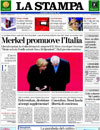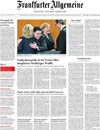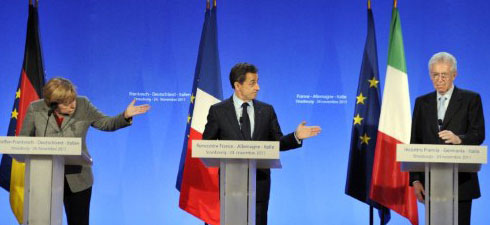"I am demanding heavy sacrifices from Italians," Monti told Die Welt newspaper. "I can only do this if concrete advantages become visible." If not, he said, "a protest against Europe will develop in Italy, including against Germany, which is seen as the ringleader of EU intolerance, and against the European Central Bank." His words seem to have been heard. For the Italian press, Mario Monti’s first visit was positive, albeit not sufficient to save the euro. Headlining with “Merkel endorses Italy” La Stampa remarks that:

Mario Monti’s Italy has been welcomed by Germany, and the outline of a European treaty under discussion no longer appears to be a threat. […] Put simply, Monti told Angela Merkel that he fully understands German obstinacy on the issue of the discipline and efficiency of other eurozone countries, even if this means leaving them to wait on the brink. But he also warned that this game of chance should not be allowed to continue for too long, and explained Italy’s resistance level.
For its part, La Repubblica notes that Germany appears “slightly more open,” but argues that even if Monti has succeeded in obtaining a relaxation of the budgetary controls envisaged within the framework of the treaty on reinforced economic union, which is up for discussion at the end of January -

... there has hardly been any progress on European measures to reassure the markets. Chancellor Merkel’s praise for the initiatives undertaken by Monti’s government […] is a testament to the extent of European fear inspired by the spectre of Italian economic collapse and of the profound relief prompted by the resumption of responsible government. But it will not be sufficient to save either this country, or, in all likelihood, the euro.
Finally, Il Sole 24 Ore argues that the problem in Europe “is no longer Italy” but Germany. At a time when Europe and Germany are menaced by recession, and recovery is dependent on a European initiative-

… all Merkel has to offer Monti’s Italy is words: words that are certainly new, but still only words. […] At a time when the fate of the euro hangs in the balance, we have a German Chancellor who speaks about Europe without saying anything — while doing even less — and one who attempts to directly control her partners’ budgetary policies without offering anything in exchange. This is serious cause for concern: notably because the game has been allowed to continue for too long, and, as the markets have shown, it simply does not work. We have reached a point where it is time to stop blaming the irresponsible behaviour of Mediterranean countries, which are paying a high social cost for the painful effort to get back into step. If the goal is to save the euro and not to sink it, we should instead be speaking about German irresponsibility.
In Germany, Frankfurter Allgemeine Zeitung welcomes the Chancellor’s praise for the reforms undertaken by Monti’s government, while recommending that the Italian government leader pluck up the courage to tax the enormous private fortunes in his country. The conservative daily is also rankled by Monti’s bid to enable his country to borrow at a lower rate on financial markets:

EU partners have always been more than patient with Italy’s tendency to stray from a tolerable level of indebtedness. The Italians failed to take advantabge of the greatest gift of the euro — unusually low interest rates — to restore their public finances. [...] The EU has no obligation to offer lower interest rates to Italy, but rather Rome has an obligation to its partners, and that is to reduce its debt.
Berlin’s insistence on more austerity has prompted increasing opposition in Europe, remarks Der Spiegel Online, which notes that this has now resulted in a change in the of the balance of power in the EU. Headling with “Two against Merkel,” the news website notes that Nicolas Sarkozy and Mario Monti are now acting as “duo” in their bid to counter Angela Merkel :

On occasion, hopes can turn into uncomfortable disappointments. [...] Monti no longer wants to cut costs. He wants another policy, which is completely different to the one advocated by Angela Merkel. [...] And his demands are the same as those that have been tabled by Paris for quite some time. [...] Until now, Merkel has more often than not succeeded in obstructing the French. However, Paris will now benefit from support from Italy, which is the Eurozone’s third largest economy. At the end of last week, Monti visited the French President to agree on the way ahead. Rumour has it that the atmosphere at the meeting was more than harmonious.
Was this article useful? If so we are delighted!
It is freely available because we believe that the right to free and independent information is essential for democracy. But this right is not guaranteed forever, and independence comes at a cost. We need your support in order to continue publishing independent, multilingual news for all Europeans.
Discover our subscription offers and their exclusive benefits and become a member of our community now!












